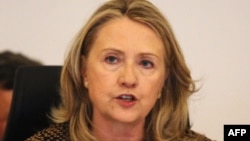ISTANBUL - U.S. Secretary of State Hillary Clinton, assisting in opening a global counterterrorism conference, says terrorist threats in Africa and the Middle East demand greater international coordination of intelligence services and law enforcement.
Secretary Clinton says the core of al-Qaida that carried out the 2001 attacks in the United States may be on the path to defeat, but an "urgent and undeniable" danger remains as terrorists become more geographically diverse.
"Terrorists now hold territory in Mali, Somalia, and Yemen. They are carrying out frequent and destabilizing attacks in Nigeria and the Maghreb," said Clinton. "Here in Turkey, the PKK continues its long campaign of terror and violence, which has claimed tens of thousands of lives."
At a global terrorism conference in the Turkish capital, Clinton called for greater international cooperation integrating both military and civilian power -- using intelligence services, law enforcement, diplomacy, development and humanitarian assistance to confront the threat.
"To defeat a terrorist network, we need to do more than remove terrorists from the battlefield. We also need to attack finances, recruitment and safe havens. We need to take on [confront] ideology and diminish its appeal, particularly to young people. We need to improve conditions for women, because their security is a bellwether for societies' security," Clinton stated. "And, we need to help build the capacities of nations that have the political will to take on this fight."
Clinton says popular protests across North Africa and the Middle East are dealing what she calls "a devastating blow to extremist ideology" as citizens demand more accountable governance and broader economic opportunity without the rhetoric of hate and destruction that al-Qaida claims is the only way to bring change.
"Now the transitions under way have the potential to transform - and improve - counterterrorism efforts across the region," said Clinton.
When it comes to counterterrorism, Clinton says the ends do not always justify the means. She says it is short-sighted and wrong to justify torture and abuse in the name of keeping citizens safe, because human rights violations undermine the rule of law and feed radicalization.
She acknowledges that the United States has not always lived up to its own ideals in this regard and must do a better job of addressing what she calls "the mistaken belief that we use our power casually."
The Bush administration was widely criticized for what it called "enhanced interrogation techniques" in its fight against terrorism, including waterboarding and the rendition of terrorist suspects to third countries. And, Pakistan and Afghanistan have long complained about civilian deaths from U.S. drone strikes.
Clinton says Washington will always maintain its right to use force against groups such as al-Qaida that have attacked and still threaten attack. But she says President Barack Obama has made clear that, in doing so, the United States will comply with all applicable law, including the laws of war, and, in her words, "go to extraordinary lengths to ensure precision and avoid the loss of innocent life."
Secretary Clinton says the core of al-Qaida that carried out the 2001 attacks in the United States may be on the path to defeat, but an "urgent and undeniable" danger remains as terrorists become more geographically diverse.
"Terrorists now hold territory in Mali, Somalia, and Yemen. They are carrying out frequent and destabilizing attacks in Nigeria and the Maghreb," said Clinton. "Here in Turkey, the PKK continues its long campaign of terror and violence, which has claimed tens of thousands of lives."
At a global terrorism conference in the Turkish capital, Clinton called for greater international cooperation integrating both military and civilian power -- using intelligence services, law enforcement, diplomacy, development and humanitarian assistance to confront the threat.
"To defeat a terrorist network, we need to do more than remove terrorists from the battlefield. We also need to attack finances, recruitment and safe havens. We need to take on [confront] ideology and diminish its appeal, particularly to young people. We need to improve conditions for women, because their security is a bellwether for societies' security," Clinton stated. "And, we need to help build the capacities of nations that have the political will to take on this fight."
Clinton says popular protests across North Africa and the Middle East are dealing what she calls "a devastating blow to extremist ideology" as citizens demand more accountable governance and broader economic opportunity without the rhetoric of hate and destruction that al-Qaida claims is the only way to bring change.
"Now the transitions under way have the potential to transform - and improve - counterterrorism efforts across the region," said Clinton.
When it comes to counterterrorism, Clinton says the ends do not always justify the means. She says it is short-sighted and wrong to justify torture and abuse in the name of keeping citizens safe, because human rights violations undermine the rule of law and feed radicalization.
She acknowledges that the United States has not always lived up to its own ideals in this regard and must do a better job of addressing what she calls "the mistaken belief that we use our power casually."
The Bush administration was widely criticized for what it called "enhanced interrogation techniques" in its fight against terrorism, including waterboarding and the rendition of terrorist suspects to third countries. And, Pakistan and Afghanistan have long complained about civilian deaths from U.S. drone strikes.
Clinton says Washington will always maintain its right to use force against groups such as al-Qaida that have attacked and still threaten attack. But she says President Barack Obama has made clear that, in doing so, the United States will comply with all applicable law, including the laws of war, and, in her words, "go to extraordinary lengths to ensure precision and avoid the loss of innocent life."




